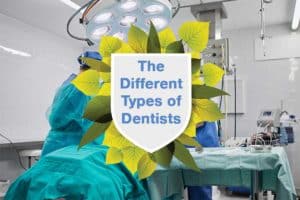 There are so many different types of dentists and dental specialists. Plus, they have super confusing names! Here is a description of each type of dental specialist and a little bit about their specific profession.
There are so many different types of dentists and dental specialists. Plus, they have super confusing names! Here is a description of each type of dental specialist and a little bit about their specific profession.
Different Types of Dentists
General Dentist: General, or family dentists, are the most common type of dentist found in the United States. To become a dentist, typically a 4-year dental school program (beyond an undergraduate degree) is required. A dentist can achieve their certificate as a DDS (Doctor of Dental Surgery) or a DMD (Doctor of Medicinal Dentistry). These degrees are essentially the same and use the same curriculum requirements. Geography and tradition is often what determines what type of degree a school offers. Fun thing to note: Dentists are cool.
Pediatric Dentist: A pediatric dentist is a dentist who specifically works with children. They specialize in infants, children, adolescents, and those with special health care needs. Their skill set is specific for these patient demographics and pediatric dentists have years of additional training to understand the needs of children behaviorally. They also develop an in-depth understanding of oral diseases that affect growing children. A pediatric dentist requires 2 additional years of schooling beyond his/her DDS or DMD degree, frequently in hospital based settings.
Orthodontist: An orthodontist specializes in the correction of malpositioned teeth and jaws. According to Wikipedia, the word “orthodontics” is “derived from the Greek orthos (“correct”, “straight”) and -odont- (“tooth”).” An additional 2-3 years of training is typically required for this degree beyond the DDS or DMD degree, and Orthodontists are awarded a Masters degree at completion.
Periodontist: A periodontist specializes in bone and gums, periodontal (or gum) disease and the placement of dental implants. Typically, a dentist will refer you to a periodontist if you show signs of gum disease and/or need a deeper cleaning than a general dental hygienist can perform. Periodontists need 3 additional years of school beyond their DDS or DMD degree and are also experts in placing, maintaining, and repairing dental implants. Speaking of placing implants…
Oral Surgeon: An oral surgeon is technically known as an Oral and Maxillofacial Surgeon and specializes in extractions (including wisdom teeth), tissue grafting, surgery to repair fractures, trauma and laceration repair, and dental implant related surgeries. They can also perform orthognathic surgery to straighten crooked jaws. In the United States, oral surgery programs require 4 or 6 years beyond a DDS of DMD degree. Some programs award a separate MD degree upon completion. Depending on the oral surgeon, they can treat anything related to your skull, jaw, face, mouth and neck. My sister once had a mole on her chin removed beautifully by an oral surgeon.
Endodontist: An endodontist specializing in the inside of the tooth and is best known for expertly performing root canals. There are general dentists who perform root canals but sometimes root canals can get significantly more complicated and should be performed by a specialist. That’s where an endodontist steps in with their 2-3 years of additional training. Endodontists are known for saving teeth and can diagnose tooth pain, place implants, and use state of the art technology to keep your teeth in your mouth.
Prosthodontist: A prosthodontist is an expert in replacing and restoring teeth. 3 years of school beyond their dental degree gives them an incredible understanding of what it takes to restore your smile with crowns, bridges, dentures, etc. They also specialize in jaws and disorders related to the jaw, such as TMJ/TMD.
This article was written by Lauren White, Brand & Environmental Director at White Dental Studio in Ashland, OR.

Recent Comments